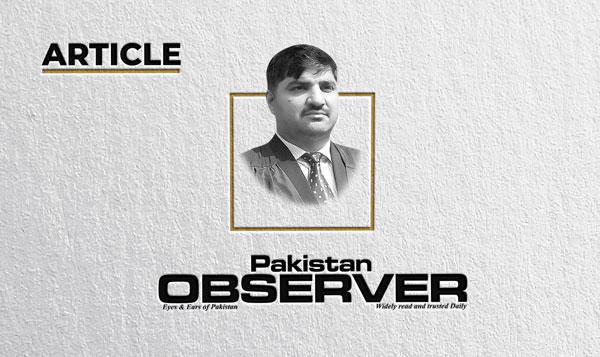A commoner among aristocrats
PAKISTANI society has inherited feudalists, landlords since its birth. The politics in the country is monopolized by some well-known families.
The members of these families have affiliation to one political party or the other and in some cases they have political affiliation with different political parties.
Very few political leaders came to the corridors of political power through street politics and later on they also joined the club of political aristocrats.
This led to dynastic politics wherein political power travels from one generation to next generation.
In such political culture, meritocracy and true democratic cultural values are far cries. A democratic culture is the guarantee of a strong national security system.
Ironically, in Pakistan the legislature and executive are under the control of pseudo-democratic elements.
Election is not sole criterion to gauge democracy in any society. If it is so, then in Pakistan the military regimes held more elections in the country.
They have also introduced local government systems in different eras and also held local bodies’ elections to flourish local democracy in Pakistan.
Such local democratic institutions were never let by the political leaders in the country because they perceive these institutions as a threat to break their political monopolies.
Contrary to this, the commoners (rank and file) join Pakistan defence forces to serve the nation according to their abilities and capabilities.
These commoners through meritorious process reach to the highest ranks in their institutions. They go through a cumbersome training and other courses to get any high rank.
Among these commoners, General Asim Munir Shah, the incumbent Chief of the Army Staff is one of them. He has a humble family background. He was not born with a silver spoon in his mouth.
He declared his property and other assets to ensure self-accountability and to promote sense of patriotism.
He also announced to keep his institution away from active politics. He focuses on his professional tasks because the country is the quagmire of both internal and external threats.
His visit to eastern and western borders reflects his strong resolve to counter external threats and to make Pakistan and its people safe from such threats.
Now several questions need to be answered.
(i) Who will resolve the ongoing unabated political confrontation among political parties?
(ii) Who will address the current economic crisis?
(iii) Who will address to securitize the people of Pakistan against ongoing new wave of terrorism?
(iv) Have the current political regime and opposition collective wisdom to come out of present political and economic turmoil?
Unfortunately, the political leaders are engaged in extreme degree of shambolic politics and least bother to national security.
In such a situation, should the defence forces and security agencies remained silent spectators to see the country to lead to catastrophic scene.
The answer certainly will be ‘no’. The recent terrorist attack on Police Post in Lakki Marwat in which several Jawans of Police force embraced martyrdom but the political leadership except cosmetic condolence expressed no strong resolve to combat such indent in future.
Another gruesome terrorist attack is on Counter-Terrorism Department in Bannu Cantonment where several officials were made hostage.
This new wave of terrorism and militancy is very alarming. The aristocratic political leaders expect the new CoAS to safeguard political regime.
Various political parties implicitly and explicitly want to get blessing of General Asim Munir despite his disassociation from politics.
In the ongoing political, economic and security crises, the political leaders need to show political acumen and sagacious approach.
(i) The political leaders need to address their political issues through political and constitutional means.
(ii) They set aside political differences for a time being.
(iii) They need to engage in political dialogue to overcome the current economic crisis and security threats.
(iv) The demand for general elections needs to be postponed for a time being.
(v) The government must show restrain to use political victimization.
(vi) The government must take initiative of austerity to decrease the composition of the federal cabinet to save extra-ordinary expenditure of public money from national exchequer.
(vii) The provincial government must also decrease the number of ministers and advisors at provincial levels to observe maximum austerity measures.
(viii) The opposition parties also need to demonstrate political tolerance.
(xi) Opposition parties need to play the role of a responsible opposition to bring out the country from political and economic havoc.
(x) They must halt to drag the army into politics in one way or the way.
To cut the story short, the current political and economic crisis and looming internal and external security threats are the litmus test for loyalty and sincerity for all political leaders across the board.
The history will never pardon them for any misadventure on their part. Today the coalition of thirteen major political parties rules the country at federal level.
The members of these political parties are holders of important portfolios in the government, so they have least chance to throw mud on each other.
Only Pakistan Tehreek-e-Insaf as a major party is out of federal government and plays the role of an opposition party.
They must think and act as Pakistanis and there is no reason that the country will be out of such crisis.
—The writer is Editor of Journal of Political & Security Studies, ICP & Member of Editorial Board of Journal of Wallacea, University of Western Australia.










